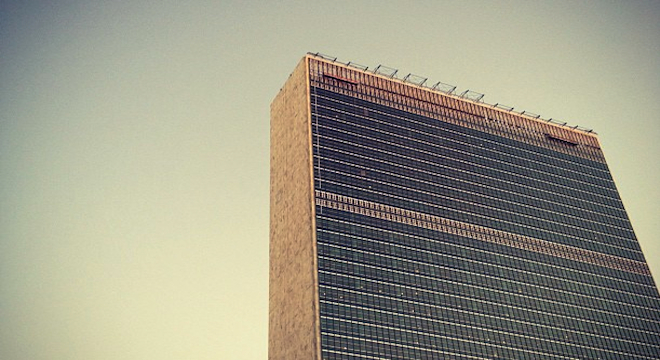EMILY GERTZ
Four social media gurus came to the United Nations headquarters in New York, NY, Monday night to advise UN staffers hoping to harness Facebook, Twitter, and other social media tools to lift millions around the world out of poverty.
Around 300 people, including approximately 70 visiting UN Development Program communications officers, as well as other UN staff, students and NYC tech professionals, filled an expansive UN conference room for the conference “Social Media: An Outside the UN Perspective.” They were joined by couple thousand online viewers on the UN website, where the conference was also broadcast live.
Here are the major points from their presentation:
Mobile, social, global
With around five billion cell phones in use around the world today — and that number poised to only grow exponentially in the coming years, especially in developing regions — mobile connectivity remains one of the most powerful tools that UN staff should harness, said Adam Hirsch, Chief Operating Officer of social media blog Mashable, particularly if and as online payment systems around the world start to standardize around a few protocols and systems, such as near field communications or NFC (also called “wave and pay” technology — found most prominently in Google Wallet technology).
Sree Sreenivasan, Digital Media Professor at the Columbia Journalism School, used CheckFacebook.com to point out some important, perhaps surprising social media trends that could aid UN anti-poverty efforts.
According to the site, 157.4 million Americans have Facebook accounts, more than any other nationality. But the social network’s reach is growing at a much faster rate in some developing nations: 4.7 million users from Brazil signed up for new Facebook accounts in the past week, as well as 3.4 million from India, compared to only 1.4 million Americans.
What this means: Facebook will have a broad reach in these two nations within a few years, with the potential to become a powerful tool in the UN’s economic development efforts.
“Traditional plus digital have to be part of everything we do,” said Sreenivasan. The revolution in Egypt “was not a social media revolution,” he said, but a real one, with people being shot and killed.
“But it took social media to make it effective,” said Sreenivasan. He pointed the audience toward his analysis on DNA Info from earlier this year of how digital media were playing into and affecting the Arab Spring uprisings.
Data-visualization, outreach, can help overcome social media skepticism
The speakers also offered advice on how to overcome workplace resistance to social media. Sreenivasan recommended using tools like Hashtracking.com (currently in a closed beta testing period, however), bit.ly, Crowdbooster and Twangulate to track and improve social network campaigns, as well as justify time-consuming social media efforts to superiors.
Hirsch said that he expects new data visualization tools to come online in 2012 that will help staffers demonstrate the impact and effectiveness of social network campaigns to their bosses.
“We probably face similar challenges to UN communications staff,” New York City digital strategist Rachel Sterne said, in convincing managers that the amount of time spent on social media, usually many hours, is worthwhile.
The diversity of the city’s digital and social media efforts suggests that Sterne and her colleagues are making headway. The city has free WiFi in every library branch as well as 40 city parks, and a special program provides broadband internet access to 18,000 schoolchildren and their famlies. New York has also opened up numerous city data sets to the public. The city held a hackathon last July that gathered developers to build apps using these data. (Though it should be noted that the city has been criticized for using its data for frivolous apps.)
Another successful outreach effort is also one of the simplest, however: At The Daily Pothole Tumblr blog, users can report potholes, see photos of crews re-paving the streets, and take in a little Department of Transportation humor.
Anonymity online is more important than ever
Alex Ross, Senior Advisor for Innovation to Secretary of State Hillary Clinton, said that with the advent of social networks, the most consequential flow of power in the world right now is not from North to South, or West to East, but from traditional hierarchies to individuals and small organizations.
“The 21st century is a lousy time to be a control freak,” Ross said. “The kind of control that we typically covet in institutions like mine and yours is gone.”
But new social technologies can offer significant rewards. Ross described an up-and-coming project between the State Department and Mexican federal law enforcement in the battle against narco-trafficking.
Citizens who report drug crimes are often murdered for their trouble, Ross said, which, naturally, inhibits such reports. So the two agencies have been collaborating to create a system that enables individuals to send information securely, while stripping away all identifying information.
“We’re being quiet about it right now,” said Ross, “but the headline is, ‘So far, so good.'”
However cool the tools, Ross caught the spirit of the evening by encouraging the UN development workers to care about social networks and technology not “because of bits, bytes, widgets or anything else. Care in order to do what you do better.”
Correction: This article originally stated there were five million mobile phones worldwide, when in fact, the number was approximately five billion. The error has since been corrected and we regret it.






